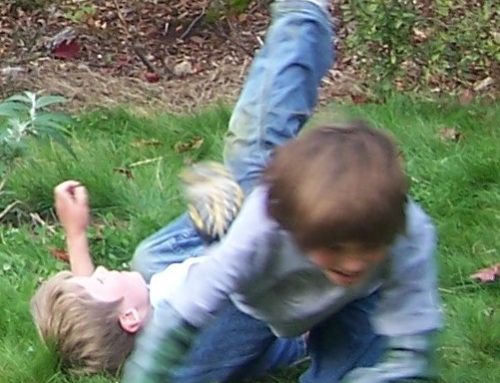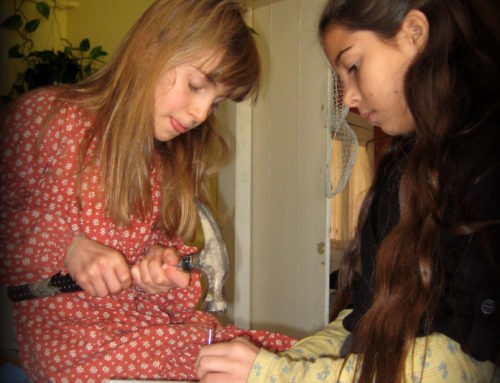Kids Trusting Themselves
Thinking children incompetent or not realizing just how capable they actually are, perhaps because we have provided them little opportunity to demonstrate their capabilities, keeps us managing their lives rather than trusting them to make decisions and be responsible for themselves. Such acts foster a relationship of dependence and enforce inequality and inability rather than bring children into parity. By constantly making decisions for kids and managing their lives we are also teaching them to look to external authority for answers and permission rather than allowing them to make their own judgments and to trust themselves. In his book, Escape From Childhood, John Holt writes, that we have set ourselves up as helpers of children, but that
“The trouble with one person defining himself as a helper of others is that unless he is very careful he is almost certain to define them as people who cannot get along without his help” (italics in the original). Children can most likely get along without our help far better than we think they can.
The kids at Moonshadow, a small community where I have spent much time reflecting on many of the subjects in this blog, are, in some ways, much more free to manage their own lives than most kids. They come and go freely, playing their own games and entertaining themselves independent of adult involvement.
By taking responsibility for kids’ safety, are we actually making them less safe?
Giving kids power over their own lives and trusting them to manage their own lives, in a way, takes such a burden off of parent or adult responsibility and frees up both the child’s and the adult’s energy. Matt Hern makes the important point that when we take responsibility for kids’ safety (and I’d say other areas of their lives as well) rather than entrusting it to them, kids become less careful and don’t take as much care of themselves. Entrusted with their lives, they must indeed take greater responsibility for themselves and their wellbeing.
As it turns out, the daily dangers are challenges to the children, to be met with patience, determination, concentration and most of all, care. People are naturally protective of their welfare, not self-destructive…] ( Matt Hern, Field Day)
Cultivating Self-Trust or dependance?
When we do not give kids choice and responsibility over other areas of their lives as well we are taking away their power and making them dependent on adult authority. If a kid has to ask every time she wants to do something instead of developing an internal sense of trust and decision-making it is not only limiting and dis-empowering but requires time and energy. The child becomes dependent on the permission of external authority rather than learning to trust her own judgment. If kids assume that someone else has the answer or will decide for them, then what motivation or opportunity do they have to take responsibility for themselves? “How are children ever going to learn responsibility when parents take away every opportunity to do something responsible on his own…” (Thomas Gordon? “Mistrust invites mistrust and perpetuates the myth “show me you are trust worthy and then I will trust you” ( Louise Dietzel.) Kids live up or down to the expectations we have of them, so if we believe they can’t be trusted, rather than putting our trust in them, they will probably prove us right.
In addition, the adults who believe that it is their responsibility to manage and control their kids’ lives and behavior must be constantly vigilant and present to grant permission, make sure that kids follow through on their authority, behave in “safe” ways etc. Not only that but…
Once you define yourself as an authority[…] you then see it as your responsibility to make people behave in a certain way. I now see what a self defeating objective this is, because I have learned that any time it’s our objective to get another person to behave a certain way, people are likely to resist no matter what we’re asking for. This seems to be true whether the person is two or ninety-two years of age (Marshall Rosenberg).
So the parents that believe it is their job to manage and control their kids’ lives, can never meet fully with success and certainly are not cultivating a relationship of mutual respect but of control and obedience. “To trust is to gradually let go of your children, allowing them to shift from dependence and reliance on you to dependence and reliance on themselves” (Louise Dietzel). Our lack of trust in our children and their ability to solve their own problems has the opposite effect.
When I worked at an elementary school, I remember how frustrating it was at moments to be asked to make decisions for kids such as whether a kid could take her coat off or not. I wanted sometimes to say… “you decide, I don’t care… if you feel like taking it off, if you are hot and would feel better without your coat on, do so.” Instead the kid has become dependent on adult permission or at least seeks it for fear of admonishment or punishment. Children then act out of fear of authority rather than an internal sense of rightness. Rather than allowing kids to trust their internal experience of things, they must seek outside approval for the validity of such experience. How long does it take to unlearn such behavior and learn to trust yourself and your own internal sense again? Some people probably never get there. Not giving kids power to make basic decisions about themselves and their lives leads to dependent relationships that are controlling of kids and take away from kids learning to trust themselves.
What choices and decisions are you making for kids that they could be making for themselves? Where are you taking responsibility for kids that they could be taking responsibility for themselves? Do you have the courage to let them make their own choices without rescuing them from the consequences of those choices?
Please leave a comment with your thoughts and questions below:


Leave A Comment